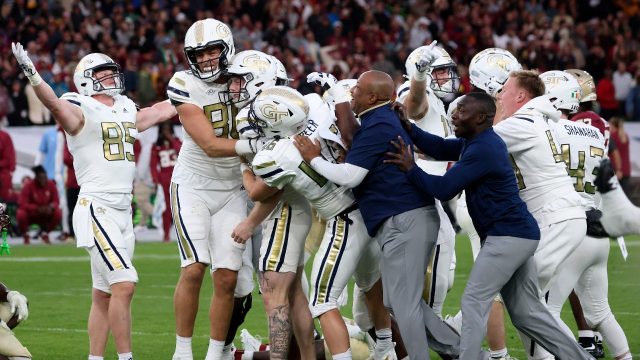
BOULDER, Colo. — Deion Sanders is adamant about keeping negativity out of his life and his football program at Colorado. He even had a newspaper columnist barred from asking questions at football-related events over what he deemed as pessimistic coverage.
For Sanders, it’s been a summer filled with integrating a new offensive line and two new coordinators, and squabbling with the media. As he prepared for the Buffaloes’ season opener against FCS powerhouse North Dakota State, the second-year Colorado coach was asked Saturday if he ever felt persecuted “by outside noise.”
“This is a way of life for me,” Sanders said. “You guys act like this is the first time I’ve been shot at, I’ve been lied on, cheated, talked about, mistreated. That’s a gospel song, ain’t it?”
A confrontational few weeks with the media culminated Friday when the university announced that Denver Post columnist Sean Keeler was banned indefinitely from asking questions at football events.
The school cited “a series of sustained, personal attacks on the football program and specifically Coach Prime, the CU Athletic Department in conjunction with the football program.”
One of the headlines on Keeler’s columns in recent weeks was “Deion Sanders is a false prophet. CU Buffs? College Football Playoffs? I’ll have what Coach Prime’s smoking.”
Sanders engaged in a combative news conference on Aug. 9, when he sparred with Keeler after accusing him of always attacking his program. Keeler suggested they meet in private to discuss the matter and Sanders agreed but said he wouldn’t allow him to ask any questions at the news conference.
Keeler’s column the next day began with the headline: “Deion Sanders, 4-8 coach, gave a 3-9 news conference. Coach Prime showed CU Buffs fans a four-letter side they hadn’t seen before: Fear.”
Keeler was in attendance Saturday but wasn’t given an opportunity with the microphone when Sanders fielded questions, nor when three of his players followed.
Keeler’s situation wasn’t specifically addressed during Sanders’ congenial 23-minute availability, but there were undertones. Asked if he tries to block out critics or whether he uses it as fuel, Sanders replied: “I’ve never read an article or a comment and said, ‘Oh, that’s going to make me go harder.’ I’m going to go hard regardless.”
Sanders’ contract with Colorado contains a clause that gives him leeway in dealing with the media. It states that his duties include “professional and consistent interaction with mutually agreed upon members of the media and the public (print, radio, television, internet and other media outlets), including access, and coordinating effectively with the Athletics Department and University communications staff.”
The university said Keeler “is still permitted to attend football-related activities as a credentialed member of the media and other reporters from the Denver Post are welcome to ask questions of football program personnel made available to the media, including coaches, players, and staff.”
In 2021, a reporter from the Mississippi Clarion Ledger was barred from covering Sanders’ Jackson State team at the Southwestern Athletic Conference media day after writing a story involving a domestic violence charge against a recruit.
On Saturday, Sanders said a question with a negative tone “lets me know where you stand.”
“As I mature, instead of shooting back or lashing out or just dismissing you, I want to know why?” Sanders said. “Let’s help each other. Let’s figure out the why. Because, if you understand the why in people that helps you tremendously.”
Sanders, who went 4-8 in his first season, declined to specify his goals for 2024 as the Buffaloes return to the Big 12 Conference.
“I want to win,” Sanders said. “Certainly, you’ve got to be an idiot if you don’t want to win in life, or you don’t want to win as a coach. That’s just stupidity if you don’t want to do that. So that’s necessary that I say those type of things, but I expect to do some amazing things. Will I share those things that we expect? No.”